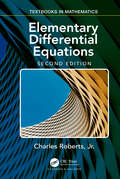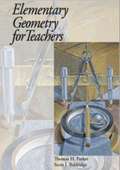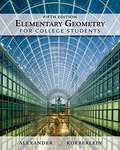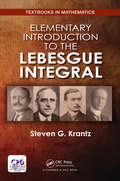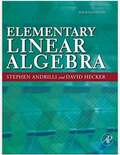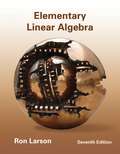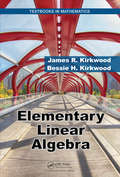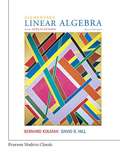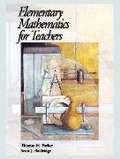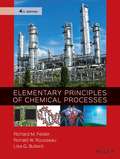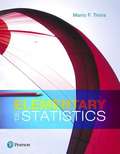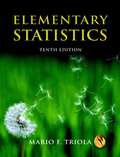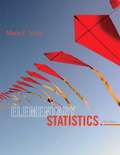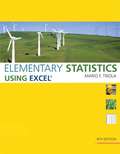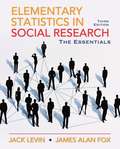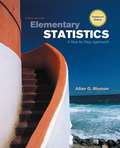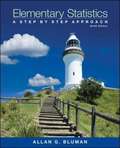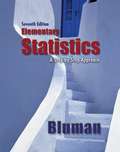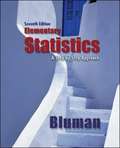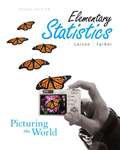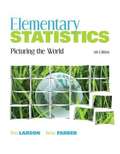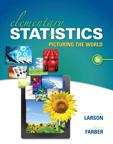- Table View
- List View
Elementary Differential Equations: Applications, Models, and Computing (Textbooks in Mathematics)
by Charles Roberts Jr.<p>Elementary Differential Equations, Second Edition is written with the knowledge that there has been a dramatic change in the past century in how solutions to differential equations are calculated. However, the way the topic has been taught in introductory courses has barely changed to reflect these advances, which leaves students at a disadvantage. This second edition has been created to address these changes and help instructors facilitate new teaching methods and the latest tools, which includes computers. <p>The text is designed to help instructors who want to use computers in their classrooms. It accomplishes this by emphasizing and integrating computers in teaching elementary or ordinary differential equations. Many examples and exercises included in the text require the use of computer software to solve problems. It should be noted that since instructors use their own preferred software, this book has been written to be independent of any specific software package. <p>Features: <p> <li>Focuses on numerical methods and computing to generate solutions <li>Features extensive coverage of nonlinear differential equations and nonlinear systems <li>Includes software programs to solve problems in the text which are located on the author's website <li>Contains a wider variety of non-mathematical models than any competing textbook</li> <p>This second edition is a valuable, up-to-date tool for instructors teaching courses about differential equations. It serves as an excellent introductory textbook for undergraduate students majoring in applied mathematics, computer science, various engineering disciplines and other sciences. They also will find that the textbook will aide them greatly in their professional careers because of its instructions on how to use computers to solve equations.</p>
Elementary Geometry For Teachers
by Thomas H. Parker Scott J. BaldridgeThis is a mathematics textbook for teachers that focuses on the parts of the K-8 curriculum involving measurement and geometry; it also includes a chapter on data, probability and statistics. It is a sequel to our text Elementary Mathematics for Teachers (EMT), which focused on arithmetic.
Elementary Geometry for College Students
by Daniel C. Alexander Geralyn M. KoeberleinBuilding on the success of its first four editions, the Fifth Edition of this market-leading text covers the important principles and real-world applications of plane geometry, with a new chapter on locus and concurrence and by adding 150-200 new problems including 90 designed to be more rigorous. Strongly influenced by both NCTM and AMATYC standards, the text takes an inductive approach that includes integrated activities and tools to promote hands-on application and discovery.
Elementary Introduction to the Lebesgue Integral (Textbooks in Mathematics)
by Steven G. KrantzIt is important and useful to have a text on the Lebesgue theory that is accessible to bright undergraduates. This is such a text. Going back to the days of Isaac Newton and Gottfried Wilhelm von Leibniz, and even to Newton's teacher Isaac Barrow, the integral has been a mainstay of mathematical analysis. The integral is a device for amalgamating information. It is a powerful and irreplaceable tool. The text concentrates on the real line. The student will be familiar with the real numbers and will be comfortable internalizing the new ideas of measure theory in that context. In addition to having copious examples and numerous figures, this book includes a Table of Notation and a Glossary.
Elementary Linear Algebra
by David Hecker Stephen AndrilliElementary Linear Algebra develops and explains in careful detail the computational techniques and fundamental theoretical results central to a first course in linear algebra. This highly acclaimed text focuses on developing the abstract thinking essential for further mathematical study. <p><p>The authors give early, intensive attention to the skills necessary to make students comfortable with mathematical proofs. The text builds a gradual and smooth transition from computational results to general theory of abstract vector spaces. It also provides flexbile coverage of practical applications, exploring a comprehensive range of topics.
Elementary Linear Algebra
by Ron LarsonThe cornerstone of ELEMENTARY LINEAR ALGEBRA is the authors' clear, careful, and concise presentation of material--written so that readers can fully understand how mathematics works. This program balances theory with examples, applications, and geometric intuition for a complete, step-by-step learning system. Featuring a new design that highlights the relevance of the mathematics and improves readability, the Seventh Edition also incorporates new conceptual Capstone exercises that reinforce multiple concepts in each section. Data and applications reflect current statistics and examples to engage users and demonstrate the link between theory and practice.
Elementary Linear Algebra (Textbooks in Mathematics)
by James R. Kirkwood Bessie H. KirkwoodElementary Linear Algebra is written for the first undergraduate course. The book focuses on the importance of linear algebra in many disciplines such as engineering, economics, statistics, and computer science. The text reinforces critical ideas and lessons of traditional topics. More importantly, the book is written in a manner that deeply ingrains computational methods.
Elementary Linear Algebra With Applications
by David Hill Bernard KolmanThis text presents the basic ideas of linear algebra in a manner that offers students a fine balance between abstraction/theory and computational skills. The emphasis is on not just teaching how to read a proof but also on how to write a proof.
Elementary Mathematics for Teachers
by Thomas H. Parker Scott J. BaldridgeA mathematics course for elementary teachers.
Elementary Principles of Chemical Processes
by Richard M. Felder Ronald W. RousseauElementary Principles of Chemical Processes, 4th Edition prepares students to formulate and solve material and energy balances in chemical process systems and lays the foundation for subsequent courses in chemical engineering. The text provides a realistic, informative, and positive introduction to the practice of chemical engineering.
Elementary Statistics
by Mario TriolaThe 13th Edition is designed to be even more flexible, with the addition of learning objectives as an organizational tool, larger data sets, and new topics in line with advancements in statistics. In addition, readers will find more support in an all-new series of videos, more opportunities for practice, and improved support for statistical software.
Elementary Statistics (10th Edition)
by Mario F. TriolaThis book is an engaging and thorough introduction to statistics for students which allows students to apply their learned skills beyond the classroom in a real-world context and encourages thinking over the blind use of mechanical procedures.
Elementary Statistics (Twelfth Edition)
by Mario F. TriolaFrom SAT scores to job search methods, statistics influences and shapes the world around us. Marty Triola's text continues to be the bestseller because it helps students understand the relationship between statistics and the world, bringing life to the theory and methods. Elementary Statistics raises the bar with every edition by incorporating an unprecedented amount of real and interesting data that will help instructors connect with students today, and help them connect statistics to their daily lives. The Twelfth Edition contains more than 1,800 exercises, 89% of which use real data and 85% of which are new. Hundreds of examples are included, 91% of which use real data and 84% of which are new. New coverage of Ethics in Statistics highlights new guidelines that have been established in industry.
Elementary Statistics Using Excel
by Mario F. TriolaElementary Statistics Using Excel, Fourth Edition, offers a complete introduction to basic statistics, featuring extensive instruction on the use of Excel spreadsheets for data analysis. Extensive Excel instructions are provided along with typical displays of results, as well as information about Excel's limitations and alternative approaches to problem-solving. Real data in many examples help readers see the prevalence of statistics in the real world.
Elementary Statistics in Social Research: The Essentials
by James Fox Jack LevinThis text provides a streamlined and accessible introduction to statistics for students in sociology, criminal justice, political science, social work, and other social sciences. This text offers an essential and accessible overview to the introduction to social statistics. Clearly written with detailed step-by-step illustrations of statistical procedures, this text provides clear and logical explanations for the rationale and use of statistical methods of social research. Numerous end-of-chapter questions in every chapter reinforce key concepts to students.
Elementary Statistics, A Step by Step Approach (Sixth Edition)
by Allan G. BlumanNIMAC-sourced textbook
Elementary Statistics: A Step By Step Approach (Ninth Edition)
by Allan G. BlumanElementary Statistics: A Step By Step Approach is for introductory statistics courses with a basic algebra prerequisite. The text follows a nontheoretical approach, explaining concepts intuitively and supporting them with abundant examples. In recent editions, Al Bluman has placed more emphasis on conceptual understanding and understanding results. Additionally step-by step instructions on how to utilize the TI-84 Plus graphing calculator, Excel, and Minitab, have also been updated to reflect the most recent editions of each technology.
Elementary Statistics: A Step by Step Approach
by Allan G. BlumanElementary Statistics: A Brief Version, 4th Edition is a shorter version of Allan Bluman's popular text Elementary Statistics: A Step by Step Approach, 6th edition. This softcover edition includes all the features of the longer book, but is designed for a course in which the time available limits the number of topics covered. The book is written for general beginning statistics courses with a basic algebra prerequisite. The book use a non-theoretical approach, explaining concepts intuitively and teaching problem solving through worked examples step-by-step.
Elementary Statistics: A Step by Step Approach
by Allan G. BlumanELEMENTARY STATISTICS: A STEP BY STEP APPROACH is for general beginning statistics courses with a basic algebra prerequisite. The book is non-theoretical, explaining concepts intuitively and teaching problem solving through worked examples and step-by-step instructions.
Elementary Statistics: Picturing The World
by Ron Larson Betsy Farber Elizabeth FarberFor algebra-based Introductory Statistics courses. Offering the most accessible approach to statistics, with a strong visual/graphical emphasis, the text offers a vast number of examples on the premise that students learn best by doing. The fourth edition features many updates and revisions that place increased emphasis on interpretation of results and critical thinking in addition to calculations. This emphasis on statistical literacy is reflective of the GAISE recommendations.
Elementary Statistics: Picturing the World (4th Edition)
by Ron Larson Betsy FarberFor algebra-based Introductory Statistics courses. Offering the most accessible approach to statistics, with a strong visual/graphical emphasis, the text offers a vast number of examples on the premise that students learn best by doing. The fourth edition features many updates and revisions that place increased emphasis on interpretation of results and critical thinking in addition to calculations. This emphasis on statistical literacy is reflective of the GAISE recommendations.
Elementary Statistics: Picturing the World (Fifth Edition)
by Ron Larson Betsy FarberThis textbook is written with a balance of rigor and simplicity. It combines step-by-step instruction, real-life examples and exercises, carefully developed features, and technology that makes statistics accessible to all. The Fifth Edition has a thorough update of the key features, examples, and exercises.
Elementary Statistics: Picturing the World, 6th Edition
by Ron Larson Betsy FarberElementary Statistics: Picturing the World, Sixth Edition, provides stepped out instruction, real-life examples and exercises, and the use of technology to offer the most accessible approach. The authors carefully develop theory through strong pedagogy, and examples show how statistics is used to picture and describe the world. In keeping with the premise that students learn best by doing, it includes more than 210 examples and more than 2300 exercises, to make the concepts of statistics a part of students' everyday lives.
Elementary Statistics: Picturing the World, Fourth Edition
by Ron Larson Betsy FarberThe book offers the most accessible approach to statistics, with a strong visual/graphical emphasis and a vast number of examples on the premise that students learn best by "doing". The fourth edition features many updates and revisions that place increased emphasis on interpretation of results and critical thinking in addition to calculations. This emphasis on "statistical literacy" is reflective of the GAISE recommendations.
